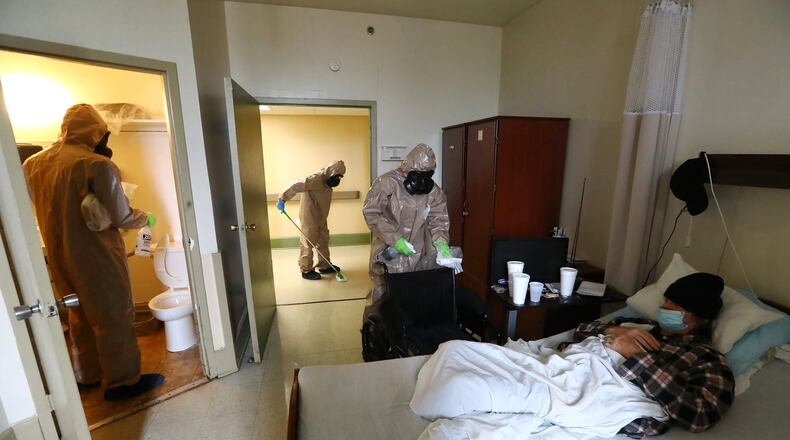Georgia has repeatedly turned to its National Guard for help responding to the coronavirus pandemic and protests for racial justice that have popped up across the state.
Several thousand members of the Georgia guard have disinfected nursing homes, where more than 1,400 residents have died from COVID-19, the highly contagious disease caused by the coronavirus. The troops have helped out at hospitals and food banks. During the demonstrations, they secured the state Capitol, Governor’s Mansion and other sites.
So far, 323 of them have tested positive for the disease, according to the Georgia guard. They are among more than 3,000 members of the National Guard from across the country who have been diagnosed with the disease.
Of the members of the Georgia guard who have been sickened, 144 have recovered and returned to duty. Six have been hospitalized. No Georgia troops have died, though a member of the New Jersey National Guard — Capt. Douglas Linn Hickok, a physician assistant — succumbed to the disease in March.
The illnesses will not affect the guard’s ability to respond to other crises, said Maj. Gen. Thomas Carden Jr., Georgia’s adjutant general. He pointed out that the Georgia guard has deployed units to Afghanistan, Europe, Iraq and the U.S.-Mexican border during the pandemic. The 323 Georgia troops who have tested positive for COVID-19 represent about 2% of Georgia’s roughly 14,000 guard members.
“The good news is that 144 have recovered already and been returned to duty and many more are right on the edge of that,” Carden said. “You have got to be fairly fit to be in this business. ... So we have weathered it pretty well.”
Related: Not the war they signed up for: Georgia Guardsmen battle COVID-19
Gov. Brian Kemp first turned to the Georgia National Guard for help March 14, when he declared a public health emergency and ordered up to 2,000 troops to help respond to the coronavirus outbreak. On April 8, as the pandemic continued to rampage across the state, he called for 1,000 more members of the guard.
Responding to the Atlanta-area protests on May 29, Kemp declared a state of emergency in Fulton County and called for up to 500 Georgia troops, authorizing them to make arrests. That decision drew criticism from Atlanta Mayor Keisha Lance Bottoms, who urged the governor to focus state resources on responding to the state’s soaring number of coronavirus cases. The protests continued, so on July 6, Kemp declared a state of emergency again and called for up to 1,000 guard members.
More than 280 of the Georgia troops received their positive test results after May 29, when they were deployed in response to the protests. The troops have sought to protect themselves from COVID-19 with masks, gloves and Tyvek suits. To shield their families from the disease, some have stayed in hotels in Kennesaw and Marietta.
In all, 28,660 National Guard troops have responded to the pandemic in all 50 states, three U.S. territories and Washington, D.C. They have manned call centers, collected samples from patients, and helped deliver food and supplies. Guard members from Nebraska, West Virginia and the city of Washington have also tested positive for COVID-19 after responding to demonstrations and aiding food banks, according to news media reports.
“The health and welfare of our Guard members and their communities is a priority, as we protect the communities in which we live and work,” Maj. Rob Perino, a spokesman for the National Guard Bureau, said in an email. “We will not ask a Guard member to perform any mission without the proper protection. We are taking deliberate measures to minimize situations where Guard members work in close quarters.”
About the Author
Keep Reading
The Latest
Featured


